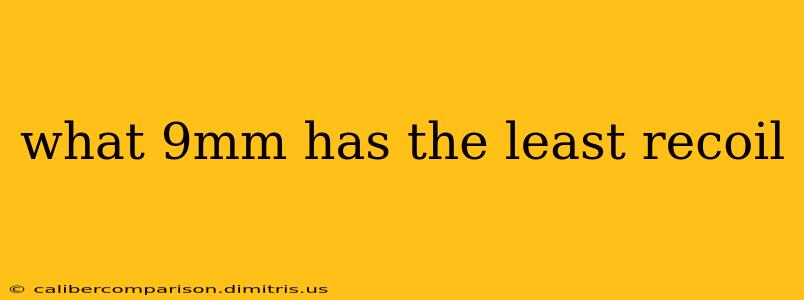Choosing a 9mm handgun often comes down to personal preference, but recoil is a significant factor for many. Lower recoil translates to greater control, faster follow-up shots, and improved accuracy, especially for newer shooters or those with smaller hands. This guide will explore the factors influencing 9mm recoil and identify some models generally known for their manageable recoil characteristics.
Understanding 9mm Recoil: More Than Just Weight
While heavier guns generally have less felt recoil, the equation isn't that simple. Several interacting factors influence how much recoil a shooter perceives:
-
Weight: Heavier handguns absorb more of the energy from the cartridge, resulting in less recoil felt by the shooter. This is a significant factor.
-
Caliber and Cartridge: While we're focusing on 9mm, even within this caliber, variations exist. Subsonic ammunition, for example, generally produces less recoil than standard velocity rounds. The specific powder load and bullet weight within a 9mm cartridge can affect recoil.
-
Barrel Length: Longer barrels allow more time for the expanding gases to push the bullet, reducing felt recoil slightly.
-
Grips: The ergonomics and texture of the handgun's grip significantly impact recoil management. A grip that fits your hand well and provides a secure hold will reduce felt recoil.
-
Action Type: Different action types (e.g., single-action, double-action, striker-fired) can subtly affect recoil characteristics due to variations in their mechanisms.
-
Individual Shooter Factors: Body size, strength, and shooting stance all play a role in how recoil is perceived.
9mm Handguns Often Cited for Lower Recoil: A Balanced Perspective
It's crucial to understand that "least recoil" is subjective. What one shooter finds manageable, another might find excessive. However, several 9mm handguns consistently receive praise for their manageable recoil. These usually incorporate features that mitigate recoil, such as higher weight and effective grip designs:
-
Larger, heavier handguns: Full-size 9mm pistols tend to have less felt recoil than their compact or subcompact counterparts. Look for models with higher weights, generally above 30 ounces (850 grams) unloaded.
-
Pistols with significant grip size: A larger grip allows for a better and more controlled hold, making the recoil easier to manage.
-
Pistols with recoil reduction systems: Some manufacturers incorporate recoil-reducing systems into their designs, although these are not always a defining characteristic of low-recoil models.
Note: Specific model recommendations are avoided here to prevent any bias or misinterpretation. Recoil is a highly personal experience. It's strongly recommended to handle and, if possible, test fire several different 9mm handguns to determine which feels best for you.
Beyond the Handgun: Ammunition Considerations
Choosing the right ammunition can significantly influence perceived recoil. As mentioned earlier, subsonic 9mm ammunition generally produces less recoil than standard velocity loads. However, this often comes at the cost of reduced velocity and effective range.
Conclusion: Finding Your Perfect Fit
Selecting a 9mm handgun with minimal recoil involves considering numerous factors beyond just the weight of the gun. It’s a personalized journey that requires hands-on experience and consideration of individual shooting preferences and physical characteristics. Visiting a reputable gun range and testing various models is highly recommended before making a purchase. Remember always to prioritize safe firearm handling practices.

